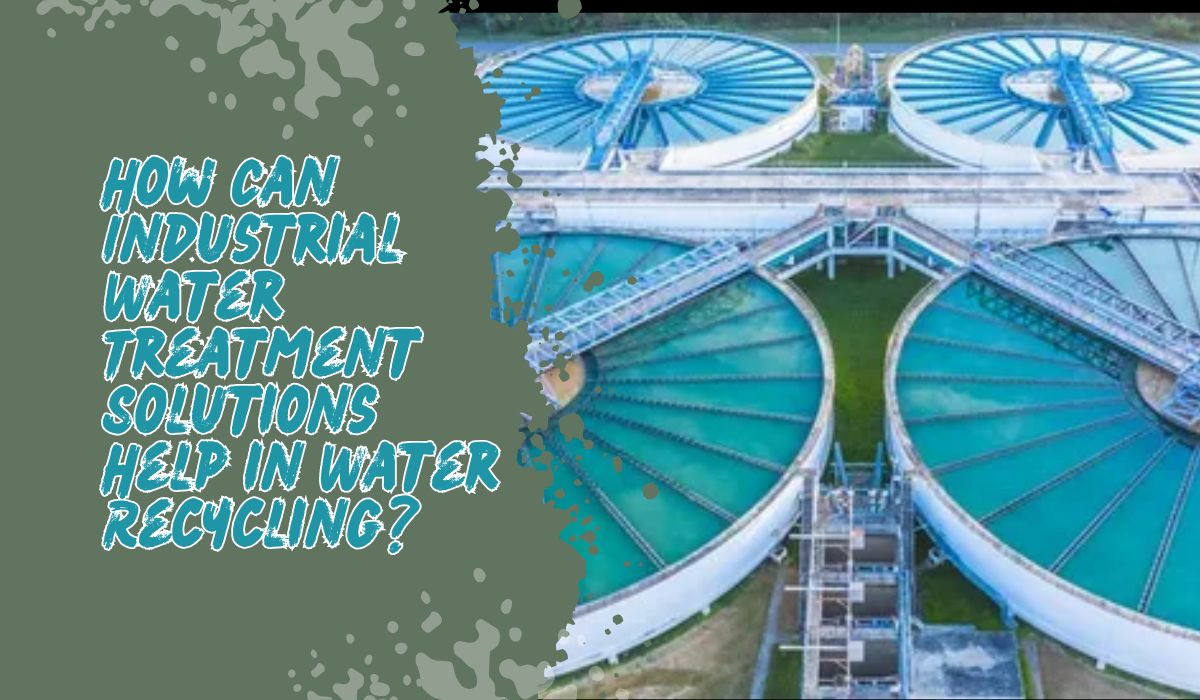Water is one of the most essential resources for industries across the globe. Whether it’s used in manufacturing, cooling systems, or cleaning processes, water is a critical part of many industrial operations. However, the growing demand for water, combined with the increasing concern about water scarcity, has pushed industries to look for ways to recycle and reuse water efficiently. This is where Industrial Water Treatment Solutions play a crucial role in water recycling.
In this article, we will discuss how industrial water treatment systems can contribute to water recycling efforts, the technologies involved, and why businesses should consider adopting these solutions. Let’s dive into how these systems work, the benefits they offer, and how they can be applied in various industries.
What Is Industrial Water Treatment?
Understanding the Basics
Industrial water treatment refers to the processes used to improve the quality of water used in industrial processes. It involves removing contaminants, impurities, and harmful substances that can affect the operations or the final product. These treatments ensure that the water used is safe, efficient, and environmentally friendly.
Water treatment in industrial settings is not limited to cleaning water for direct use. It also includes the treatment of wastewater generated during manufacturing processes. Effective treatment and recycling of wastewater can significantly reduce a company’s water usage and disposal costs while minimizing environmental impact.
Key Processes in Industrial Water Treatment
Industrial water treatment typically involves several processes, including:
- Filtration: Removing larger particles, such as dirt and debris, from the water.
- Sedimentation: Allowing heavier particles to settle at the bottom of tanks for removal.
- Chemical Treatment: Using chemicals to neutralize harmful substances and break down contaminants.
- Membrane Filtration: Using membranes to filter out smaller particles and molecules.
- Disinfection: Using methods like UV light or chlorine to kill harmful bacteria and pathogens.
The Importance of Water Recycling in Industrial Settings
Water recycling in industrial settings is important for several reasons:
- Reducing Water Consumption: Recycling water helps industries reduce their overall water usage, which is especially valuable in areas facing water scarcity.
- Lowering Operational Costs: By reusing water, industries can reduce the costs of purchasing fresh water and disposing of wastewater.
- Environmental Responsibility: Water recycling helps industries meet sustainability goals by reducing their environmental footprint.
- Compliance with Regulations: Many regions have strict environmental regulations that require industries to treat and recycle wastewater before discharging it.
How Do Industrial Water Treatment Solutions Facilitate Water Recycling?
Treatment of Wastewater for Reuse
One of the primary ways industrial water treatment solutions aid in water recycling is by treating wastewater for reuse. In many industries, water is used for processes like cooling, cleaning, or manufacturing. Once the water is used, it becomes wastewater. Instead of disposing of this wastewater, it can be treated and recycled for further use.
Key Steps in Recycling Wastewater
- Collection: Wastewater is collected from different sources in the industrial facility.
- Pre-Treatment: The water is first filtered to remove large particles and debris.
- Secondary Treatment: In this step, chemical or biological processes are used to remove dissolved contaminants and pollutants.
- Advanced Treatment: Advanced filtration methods, such as reverse osmosis or ultrafiltration, are used to remove fine particles, chemicals, and microorganisms.
- Disinfection: Finally, the water is disinfected to eliminate any remaining harmful bacteria and pathogens.
The treated water is then ready to be reused in various industrial processes, such as cooling systems, cleaning operations, or even as part of the manufacturing process.
Reducing the Need for Fresh Water
In many industrial sectors, water is used in large quantities for cooling, production, and cleaning. By implementing industrial water treatment solutions, companies can significantly reduce their reliance on fresh water. Recycling treated water reduces the need to source additional water from rivers, lakes, or municipal water supplies, which is particularly valuable in areas where water is scarce.
Recapturing Water from Industrial Processes
Certain industrial processes may involve water that contains valuable resources or chemicals that can be recaptured and reused. For example, in industries like pharmaceuticals, food processing, or textiles, water can be treated to remove chemicals or residues that would otherwise be wasted. By recycling this water, companies can reduce the environmental impact of chemical discharge and recycle valuable substances for future use.
Minimizing Pollution and Waste
Industrial water treatment solutions not only help with recycling water but also ensure that water discharged back into the environment is safe. By treating wastewater to remove harmful pollutants, companies can minimize their environmental impact and avoid violating regulations regarding water pollution.

Technologies Involved in Industrial Water Treatment for Recycling
Membrane Filtration
One of the most common technologies used in industrial water treatment for recycling is membrane filtration. This process uses specialized filters, such as reverse osmosis (RO) membranes, to remove contaminants from water. These membranes can filter out particles as small as ions, allowing for high-quality water to be reused in industrial operations.
Reverse osmosis is particularly effective in removing salts, chemicals, and other dissolved impurities from water, making it safe for reuse. This technology is commonly used in industries like food and beverage, pharmaceuticals, and manufacturing.
Ion Exchange
Ion exchange is another water treatment method that can be used to recycle water. In this process, ions in the water are exchanged with ions from a resin, removing contaminants like heavy metals, calcium, and magnesium. This method is often used to treat water that needs to be softened or purified.
Ion exchange is useful in industries that need very pure water for processes like cooling or manufacturing. It can also be used to remove harmful substances from wastewater before it is recycled for use in other industrial processes.
Activated Carbon Filtration
Activated carbon filtration is widely used in industrial water treatment systems to remove organic chemicals, chlorine, and other pollutants from water. Activated carbon works by adsorbing contaminants onto its surface, trapping them and preventing them from re-entering the water. This method is particularly effective in treating water that may contain volatile organic compounds or other chemicals that are difficult to remove with other methods.
Activated carbon filters are commonly used in industries like chemical manufacturing, food processing, and water treatment plants.
UV Disinfection
Ultraviolet (UV) disinfection is a non-chemical method used to kill bacteria, viruses, and other microorganisms in water. UV light is passed through the water, damaging the DNA of harmful organisms and preventing them from reproducing. UV disinfection is commonly used as the final step in industrial water treatment to ensure that recycled water is safe for use.
Biological Treatment
Biological treatment methods use natural processes to treat wastewater and recycle it for industrial use. In this method, microorganisms such as bacteria break down organic pollutants in the water, making it suitable for reuse. Biological treatment is often used in combination with other water treatment methods, such as membrane filtration, to ensure high-quality recycled water.
Industries That Benefit from Water Recycling
Manufacturing Industry
Manufacturers use large amounts of water for cooling, cleaning, and processing. By adopting industrial water treatment solutions, manufacturers can recycle water used in these processes and reduce their dependence on fresh water. For example, water used for cooling machinery can be treated, cleaned, and reused in the same process, minimizing water waste.
Food and Beverage Industry
The food and beverage industry uses water for cleaning, processing, and packaging. By recycling water used in these operations, companies can reduce their environmental impact while ensuring the water used is safe and compliant with health regulations. Industrial water treatment solutions help food and beverage companies maintain the necessary water quality for production.
Textile Industry
The textile industry requires vast amounts of water for dyeing, washing, and finishing fabrics. Recycling water used in these processes can reduce both water consumption and wastewater discharge. Industrial water treatment systems can remove dyes, chemicals, and other pollutants from wastewater, making it suitable for reuse in textile production.
Pharmaceutical Industry
The pharmaceutical industry requires ultra-pure water for manufacturing and cleaning processes. By recycling water used in these processes, companies can reduce costs and environmental impact while maintaining high water quality standards. Reverse osmosis and other advanced water treatment methods are commonly used to recycle water in pharmaceutical manufacturing.
Conclusion: The Future of Water Recycling with Industrial Water Treatment Solutions
Water is a valuable resource that is becoming increasingly scarce. As industries around the world continue to grow, the need for effective water recycling has never been greater. Industrial water treatment solutions offer an effective way to recycle wastewater and reduce reliance on fresh water, benefiting businesses, the environment, and society.
By adopting advanced water treatment technologies like reverse osmosis, ion exchange, and UV disinfection, industries can not only recycle water but also ensure that it meets the required quality standards for reuse. Water recycling can help businesses lower operational costs, improve sustainability, and meet environmental regulations.
For More Insightful Articles Related To This Topic, Feel Free To Visit: unbusinessnews.










